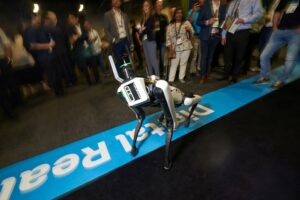In the summer of 2019, Ola Rollén, President and CEO of Hexagon, proclaimed that environmental sustainability is not a barrier to business, but the greatest business opportunity of our age. This past June, returning to the same stage at the annual HxGN Live conference in Las Vegas, Rollén doubled down. “What stands in the way becomes the way,” he said, quoting Roman emperor and philosopher Marcus Aurelius in an outline of how efforts to make sustainability profitable have accelerated despite more than two years of pandemic-related disruption.

In this case, “what stands in the way” is industry’s accountability for its impact on the environment. Turning this perceived burden into a business opportunity is all about reducing waste, which Rollén says robs roughly 20% of every dollar spent in discrete manufacturing. The big idea is that iterating and optimizing in virtual space first can turn that waste into revenue while simultaneously minimizing the use of our planet’s resources.
As a developer of reality-capture, simulation and automation technology that fuels not only smarter factories, but also smarter cities, smarter mines and even self-driving vehicles, Hexagon is ideally positioned to serve such a need. However, recent activities suggest that the global conglomerate sees its mission as more than supplying the necessary technology. Hexagon also aims to take an active role in applying it, whether via its own initiatives or through direct support of entrepreneurs and startups seeking to scale big ideas.
Consider the recent investment in a 40-hectare solar farm in Archidona, Spain. The goal of this growing venture — which is among the first for R-Evolution, a Hexagon subsidiary launched in 2021 specifically to accelerate sustainable (and profitable) transition — is not to get into the solar energy business. Rather, it is to help that business grow in a more general sense by building a blueprint for others.
With costs projected to drop and capacity projected to expand, solar energy is not a sector that appears to need any help. However, that is precisely the point. With humanity essentially running out of time, R-Evolution aims to identify what already works, then accelerate the growth trend to speed our transition to a more sustainable economy. CEO Erik Joseffson calls his business unit “the thumb” of Hexagon, in that it pulls resources and expertise from the others as-needed to meet this goal by, as he puts it, “turning talk into action.” The end result is generally a “smart digital reality” like the one created for the solar field project — that is, realistic, self-evolving simulations that essentially add autonomy to the digital twin.
For another new initiative, supporting entrepreneurs and startups constitutes the entirety of the mission. Created earlier this year, 6th Sense is a competition that invites startups to present their ideas before a panel of industry experts, who choose which proposals to back with funding, technology and the expertise required to scale. According to the company, a primary differentiator from other incubators and business accelerators is a focus on ideas already proven to be successful (for example, candidates must have series A or similar level of funding).
In keeping with the company’s broader mission, candidates must also focus on sustainability directly, or at least the technologies driving the digital revolution — namely, those involving machine learning, sensors and/or robotics. The first two winners appeared at HxGN live. SmartParts embeds digital barcodes directly into raw material to enable full product-lifecycle traceability for 3D printed parts (and, perhaps eventually, other materials for other manufacturing applications). The second, RIIICO, offers facility-layout design software with an intuitive, essentially “drag-and-drop” interface that virtually anyone can use.
Read: Focus on Throughput Empowers People and Machines
For those in the business of CNC machining, helping to save the world with data does not require such revolutionary ideas, nor any direct involvement in sustainability projects. In fact, “what stands in the way” could be as fundamental as the collection of quality data from machined parts. Rather than a necessary evil, this process could become a driver of productivity, whether for offset-correcting feedback loops or the use of digital twins for more comprehensive process optimization before machining begins.
Feedback loops aside, the more manufacturers seek to make what stands in the way become the way, the more we all stand to gain, and not just in a financial sense. It’s time to buy in.